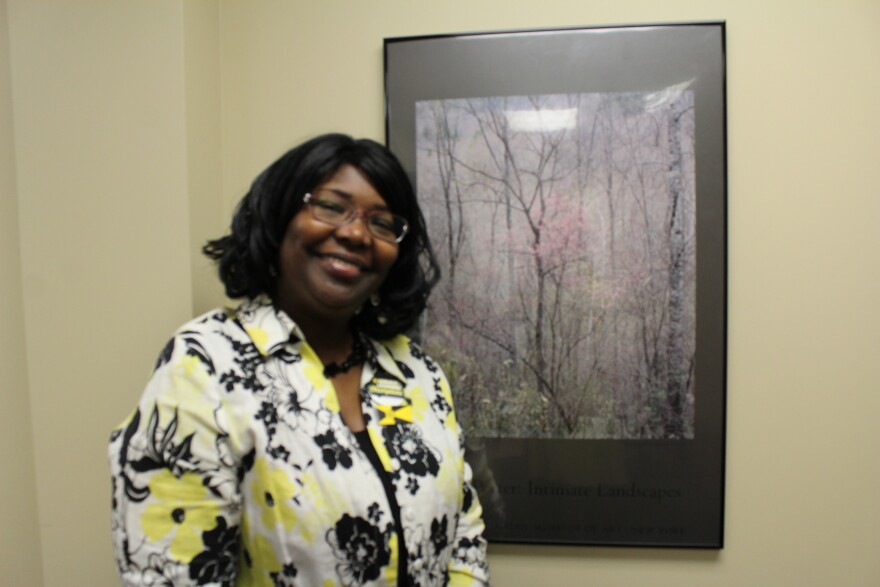Immigrants that come to Wichita to start a new life say they face significant adjustments that can be overwhelming at times. But are they getting the help they need, especially when it comes to treating mental health issues?
It's a question Araceli Amador knows well: She is originally from Mexico, and moved to Wichita more than 20 years ago following her husband, who had came here for work. Amador has grown accustomed to making adjustments in her life, but recalls a time when things were tough.
"In that period of time, when I got my crisis of depression, I wanted ... to take away my life," she says. "I feel like it was dark, everything was dark. The only thing I was thinking was that everything was going to be OK if I was dead, and then, at that very moment, my kids' pictures came to my mind to tell me that I was not going to be able to do it. I was on the highway and then I decided to go to the doctor and tell them everything."
If mental health issues are not properly addressed, they can hinder the ability to adapt, especially, Amador says, when immigrants already feel a sense of being isolated.

"The separation, the adaptation and the simulation of another culture and not living around the people that you used to know and the feeling of being unwanted because it’s really strong," Amador says. "TV, radio and everything — it sends a message like we are no good, we are people that are stealing jobs, that we are people that take things from others and all those things that are heard on the news."
And many immigrants will "bear those feelings of depression and anxiety for years," says Dr. Rhonda Lewis, a professor and chair of psychology at Wichita State University.
And it's not just adults who are impacted, but young people too.
"Children being separated from their parents [is] not a good thing," Lewis says. "We see that their brain development has been altered and there has been research to show that. It shows problems in the children in the classroom ... so it’s not a good thing.
"Instead of burying the problem, we need to bring the problem to the surface and address it."

Dr. Maribel Najera, a psychologist from the Universidad Nacional Autonoma de Mexico in Mexico City, is scheduled to be a featured speaker at Wichita State's upcoming immigration mental health conference, New Americans: A Journey into a Healthy Mind. She says these problems could be passed on from one generation to another.
"[An] issue is the communication problems between the members of the families, since each one experiences in a particular way their experiences," Najera says in a written statement. "Migratory processes are complex in the multiple dimensions, mental health is one of them, and for which it should be given the just importance."
Sonia Inamugisha is a patient care coordinator at Wichita's HealthCore Clinic, where she expects to serve more than 200 families this fiscal year.
Inamugisha meets with clients from all over the world, including Latin countries, the Middle East, Asia and Africa.
"The first thing is the fear they get," she says. "First of all, you are new to the country. You don’t know anything. The language is a problem, food is a problem ... like, everything is an issue. So there’s a fear impacting them when they first get here, especially how [others] welcome them, you know, some people fear people from other countries."

Dr. Lewis, at WSU, says safety-net clinics like HealthCore and Grace Med do serve immigrant populations, but says not everyone who needs help will seek out those services.
"We want to make sure they are connected to the services that actually will help them," she says.
And Araceli Amador says it’s important to seek that help.
"The thing is that if you got hurt you’d go to the doctor, but in mental health, it’s perceived in another way," she says. "It’s like 'Oh, she’s crazy, he’s crazy,' but no.
"When you are thinking in one way that is going to hurt yourself, you need to go to the doctor, and that doctor is a psychiatrist, a psychologist and a counselor — those are the kind of help that we need."
The New Americans: A Journey into a Healthy Mind mental health conference will be held on Tuesday, April 23, at WSU Tech located at 4004 N. Webb Rd, from 9 a.m. to 4 p.m.
Carla Eckels is director of cultural diversity and the host of Soulsations. Follow her on Twitter @Eckels. To contact KMUW News or to send in a news tip, reach us at news@kmuw.org.





